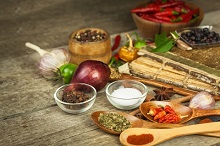It has been proven time and time again that food and a healthy eating lifestyle contributes to good health. The same can be said for aging, a proper diet and exercise can help brain functions by ensuring your loved one gets proper nutrition. And, eating a diet rich in Folic (Folate) acid (found in leafy greens like spinach and kale), Vitamin E (found in almonds and hazelnuts), and Omega-3 fatty acids found in salmon.
Below is some in depth information regarding each of this :
1. Folic (Folate) acid - Folic acid is a water-soluble B vitamin. Folate occurs naturally in food, and folic acid is the synthetic form. The Folic acid vitamin is well-tolerated in amounts found in fortified foods and supplements. Some of the best sources of the natural Folate are cereals, baked goods (Bagels), leafy vegetables (spinach, broccoli, lettuce), okra, asparagus, fruits (bananas, melons, lemons), legumes, yeast, mushrooms, organ meat (beef liver, kidney), orange juice, and tomato juice.
2. Vitamin E - Natural Vitamin E can be found in eggs, fortified cereals, fruit, green leafy vegetables (such as spinach), meat, nuts, nut oils, poultry, vegetable oils (corn, cottonseed, safflower, soybean, sunflower), argan oil, olive oil, wheat germ oil, and whole grains. It should be noted that cooking and storage may destroy some of the vitamin E found in some foods. The recommended daily intake for adults over 14 is 15 milligrams (or 22.5 IU), but for dementia/Alzheimers disease, 800-2,000 IU of Vitamin E is recommended to be taken by mouth 1-2 times daily.
3. Omega-3 fatty acids - Fish is one of the best sources of omega-3 fatty acids (salmon, halibut, trout, fresh tuna (not canned(, and oysters. Leafy green vegetables (spinach, kale, Brussels sprouts, watercress, and parsley. Seeds (Peanuts, pumpkin, and walnuts) and Oils such as (canola, flaxseed, cod liver, and soybean) all contain Omega-3 fatty acids. And foods found at the grocery store are sometimes fortified with omega-3 fatty acid, this includes whole-grain bread, pasta, cereals, flour, and foods made from enriched flour such as packaged pizza. Read the food package label it is the best way to find foods with added omega-3.
Hydration
Not drinking enough fluids will lead to dehydration and constipation. Most of the time we focus on food and forget about hydration, and that is a big mistake. Try to ensure that your loved one drinks at least several full glasses of liquids every day. To ensure proper hydration, you can give your loved one any of the following:
•High-calorie, healthy shakes, milk shakes, and smoothie's. You can add supplements to them including protein powders (available at grocery stores, drugstores and discount retailers).
•Water, Vitamin-infused waters, juice, and other healthy beverages but avoid drinks with caffeine, which can increase restlessness, interfere with sleep and trigger a frequent need to urinate.
For more information and to research other option you can visit the Mayo Clinic by clicking on this link:
Mayo Clinic




 It has been proven time and time again that food and a healthy eating lifestyle contributes to good health. The same can be said for aging, a proper diet and exercise can help brain functions by ensuring your loved one gets proper nutrition. And, eating a diet rich in Folic (Folate) acid (found in leafy greens like spinach and kale), Vitamin E (found in almonds and hazelnuts), and Omega-3 fatty acids found in salmon.
It has been proven time and time again that food and a healthy eating lifestyle contributes to good health. The same can be said for aging, a proper diet and exercise can help brain functions by ensuring your loved one gets proper nutrition. And, eating a diet rich in Folic (Folate) acid (found in leafy greens like spinach and kale), Vitamin E (found in almonds and hazelnuts), and Omega-3 fatty acids found in salmon.